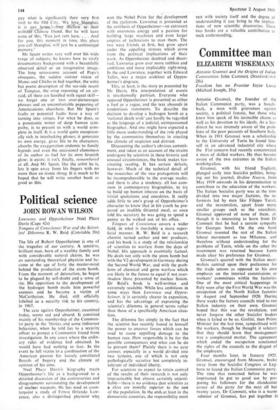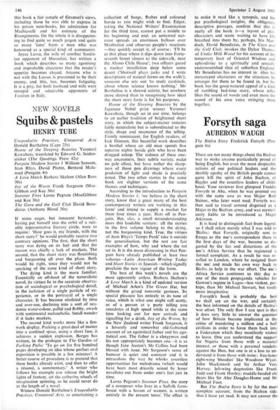Committee man
ELIZABETH WISKEMANN
Antonio Gramsci and the Origins of Italian Communism John Cammett (Stanford/OUP 28s) Freedom has no Frontier Joyce Lussu (Michael Joseph, 35s) Antonio Gramsci, the founder of the Italian Communist party, was a hunch- back, a man with grievances against society, a political fanatic, but those who knew him speak of his invincible charm as well as his devotion to his ideals. As a Sar- dinian he was intensely aware of the prob- lems of the poor peasants of Southern Italy. When in 1911 Gramsci won a scholarship to the University of Turin he found him- self in an advanced industrial city where the Fiat concern had recently concentrated a mass of skilled workers. He thus became aware of the two extremes in the Italian working-class.
Gramsci, with his friend Togliatti, plunged early into Socialist politics, bring- ing out his journal, Ordine Nuovo, from May 1919 onwards in his determination to contribute to the education of the workers. The Italian Socialist party was. at the time divided into two major factions, the re- formists led by men like Filippo Turati, and the maximalists, apart from many smaller groups such as the anarchists. Gramsci approved of none of them, al- though it is interesting to learn from Dr Cammett that he had a certain sympathy for Georges Sorel. On the one hand Gramsci resented the rest of the Italian labour movement as too Milanese, and therefore without understanding for the problems of Turin, while on the other the resentment was returned because Lenin made clear his preference for Gramsci.
Gramsci's quarrel with the Italian maxi- malists centred upon their preference for the trade unions as opposed to his own emphasis on the internal commissions or workers' committees within the factories. One of the most critical happenings in Italy soon after the First World War was the occupation of the North Italian factories in August and September 1920. During these weeks the factory councils tried to run Italian industry on their own. Gramsci hoped that this was the revolution, and never forgave the other Socialist leaders when it failed to be so. Giolitti, then Prime Minister for the last time, sympathised with the workers, though he thought it salutary that they should learn that management was a complicated matter. The agreement which ended the occupation sanctioned the rights of the councils to the disgust of the employers.
Four months later, in January 1921, Gramsci, encouraged from Moscow, broke away from the Socialist Congress at Leg- horn to found the Italian Communist party. The time that remained before he was imprisoned he put to good use by pre- paring his followers for the clandestine career of the party for the next all but twenty years. Dr Cammett, who is a warm admirer of Gramsci, has put together in this book a fair sample of Gramsci's views, including those he was able to express in his prison note-books, his admiration for Machiavelli and his estimate of the Risorgimento. On the whole it is disappoint- ing to find quite so much jargon and quite so many 'isms' from a man who was honoured as a special kind of communist.
Joyce. Lussu, the wife of another Sardin- ian opponent of Mussolini, has written a book which describes so many agonising and improbable situations that the reader's appetite becomes cloyed. Anyone who is not with the Lussus is presumed to be their enemy, and this, too, becomes fatiguing. It is a pity, for both husband and wife were intrepid and admirable opponents of Fascism in Italy.



































 Previous page
Previous page